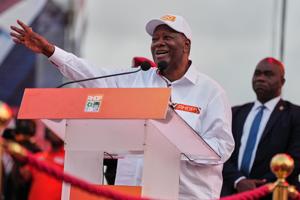Ivory Coast is set to hold a crucial election on Saturday, August 5, 2023, as President Alassane Ouattara aims for a fourth term amid rising allegations of opposition suppression. With 8.7 million registered voters, polling stations will open at 08:00 GMT and close at 18:00 GMT. The election occurs against a backdrop of protests and fears of unrest reminiscent of past electoral violence.
The political landscape has shifted significantly in the lead-up to this election. Notably, key opposition figures such as Tidjane Thiam, a former executive at Credit Suisse, and Laurent Gbagbo, a former president with substantial support among voters, were excluded from the candidate list. Their absence has fueled public dissent, leading to protests that resulted in hundreds of arrests. The government has deployed over 40,000 security personnel nationwide, further highlighting the tense atmosphere surrounding the election.
Political Context and Historical Significance
This election is emblematic of a broader trend across Africa, where aging leaders maintain their grip on power despite the continent’s youthful demographic. Alongside Ouattara, who is 83 years old, leaders like Paul Biya of Cameroon and Yoweri Museveni of Uganda continue to govern well into their advanced years. If successful, Ouattara would extend his presidency to nearly two decades, having previously overseen significant economic growth since the end of the civil war.
Although the economy has grown at an impressive annual rate of 6%, driven largely by the cocoa industry, persistent poverty affects approximately 37.5% of the population. Youth unemployment remains a pressing issue, leading to discontent among younger voters. Analysts suggest that while Ouattara’s party, the Rally of Houphouetistes for Democracy and Peace (RHDP), holds a majority in parliament, this does not negate the urgent need for effective policies addressing youth job creation and poverty alleviation.
Election Dynamics and Candidate Landscape
In total, five candidates are challenging Ouattara, including Simone Gbagbo, a former first lady, and Jean-Louis Billion, who served as commerce minister under Ouattara. Despite their efforts to present viable alternatives, analysts indicate that none possess a strong chance of winning. Campaign promises from these candidates include job creation and innovative agricultural policies aimed at revitalizing the economy.
At his final rally in Abidjan, Ouattara emphasized the need for continuity in governance, stating, “The growth has been huge, but we need to continue.” His economic policies, particularly in public sector investment and infrastructure development, have garnered significant support among his base.
The international community has shown limited scrutiny of Ouattara’s administration, as geopolitical interests shift. Séverin Yao Kouamé, a research professor at the University of Bouaké, noted that both the international community and France, a former colonial power, appear to have other priorities, allowing Ouattara to navigate this election relatively unchallenged.
As the election unfolds, the global community will watch closely, particularly given the historical context and the potential for unrest. The provisional results are expected within 48 hours after polls close, marking a pivotal moment in Ivory Coast’s political future.
